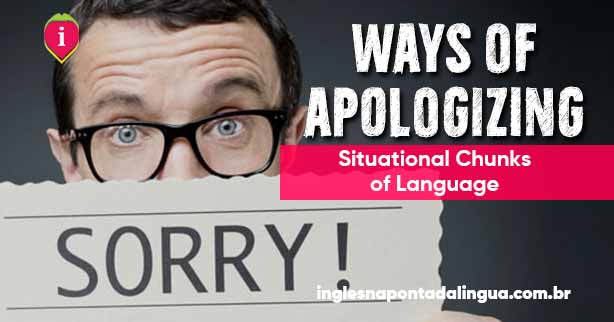Ways of Apologizing in English | Chunks of Language
Searching for different ways of apologizing in English? Wanna learn more ways to be more precise when saying sorry in English?
Well, here ‘ll teach you a couple of phrases, sentences and words – chunks of language – you can use whenever you need to apologize in English.
Keep reading!
Ways of Apologizing | the most common
First, the most common way of apologizing in English is by saying “Sorry” or “I’m sorry”. There is no secret here. These are used when you have done something which has upset someone or caused them difficulties, or when you bump into them accidentally.
- I’m really sorry if I said anything wrong.
- I’m sorry, I forgot.
- I’m sorry. I can’t meet you tomorrow.
You can find many more examples with “sorry” by carrying out a search on Google or by looking it up on a good dictionary. Apart from “sorry”, there are, of course, other ways of apologizing, so let’s learn them.
Being more formal

When the situation requires something more polite and formal, then you’d better say “I’d like to apologize for…”. Listen to these examples:
- I’d like to apologize for saying that. I didn’t mean it, ok?
- I’d like to apologize for any inconvenience I may have caused you.
- I’d like to apologize for not going to your reception.
- I’d like to apologize for what happened yesterday. I don’t know what came over me.
Let’s now imagine that you did something accidentally or you need to interrupt someone. In such situations, there are two things people usually say: “Excuse me” or “I beg your pardon”. Some examples:
- Excuse me, but there’s a phone call for you.
- Oh, excuse me, I didn’t see you standing there.
- I beg your pardon, I didn’t mean to interrupt you.
- I beg your pardon. I thought you were someone else.
In case you treat someone badly, for example by blaming them for something they actually didn’t do it, what you may say is: “I owe you an apology”.
- Hey, Mike, I guess I owe you an apology, you know.
- Look, I owe you an apology for the things I said about your work.
- Well, I really owe you an apology. I think I overreacted.
Another way of apologizing in more formal situations or when making an apology in an official announcement is “Please, accept my apologies”. If a company or group of people is the one apologizing, then you may hear “Please, accept our apologies”. Listen to some examples:
- We accept that this was the company’s fault and ask you to accept our sincere apologies.
- My apologies if I have offended you in any way.
- My apologies if I have misunderstood your intentions.
Some replies
As I said before, learning ways of apologizing is important when learning a second language. However, it’s also important to learn what to say when you accept an apology. So, there you go a list of some of the things you may hear or say as responses to apologies.
- Oh, come on, it’s ok.
- Apologies accepted.
- Well, we all make mistakes, don’t we?
- No problem.
- There’s nothing to apologize for.
- No hard feelings, right?
Well guys, that’s all for now!
I hope you’ve enjoyed the tips.
Now all you have to do is to have them in your lexical notebook, practice and get used to using them.
Take care and keep learning!




Really it is very useful, especially when we are learning ,we commit many mistakes and learn when to apologize is essential.
awesome podcast as always Denilson =]thanks for teaching me almost everything I know, ingles na ponta da lingua is my favorite English website =D
It was way better when you used to translate the sentences, =/
PERFECT this is the way to learn english, no TRANSLATIONS! 😀
Olá Líva, obrigado pela sugestão. O curioso é que era para estar da forma como você sugeriu. Alguma coisa foi mudada por aqui e não percebi isso. Já vou corrigir! 😉
Oi, Denilso! Eu ouço seus podcasts no iTunes, eles são ótimos, a expressão ”what’s going on” eu aprendi com seu podcast, parabéns pelo trabalho!
Obrigado pelo feedback, Johnny!